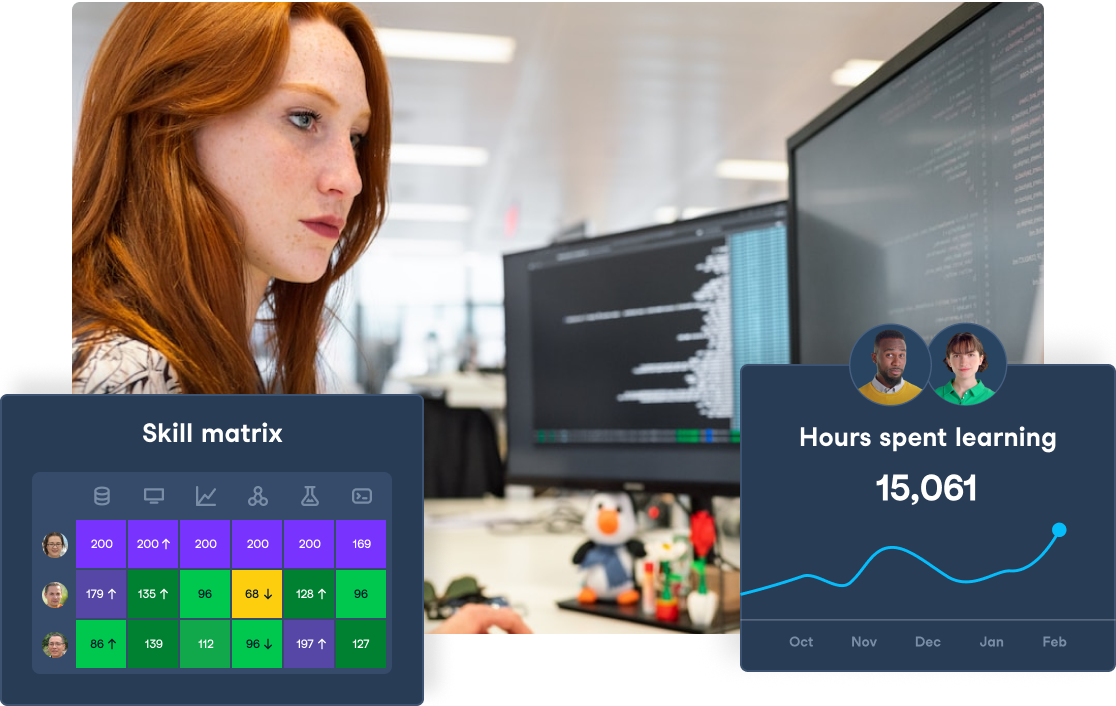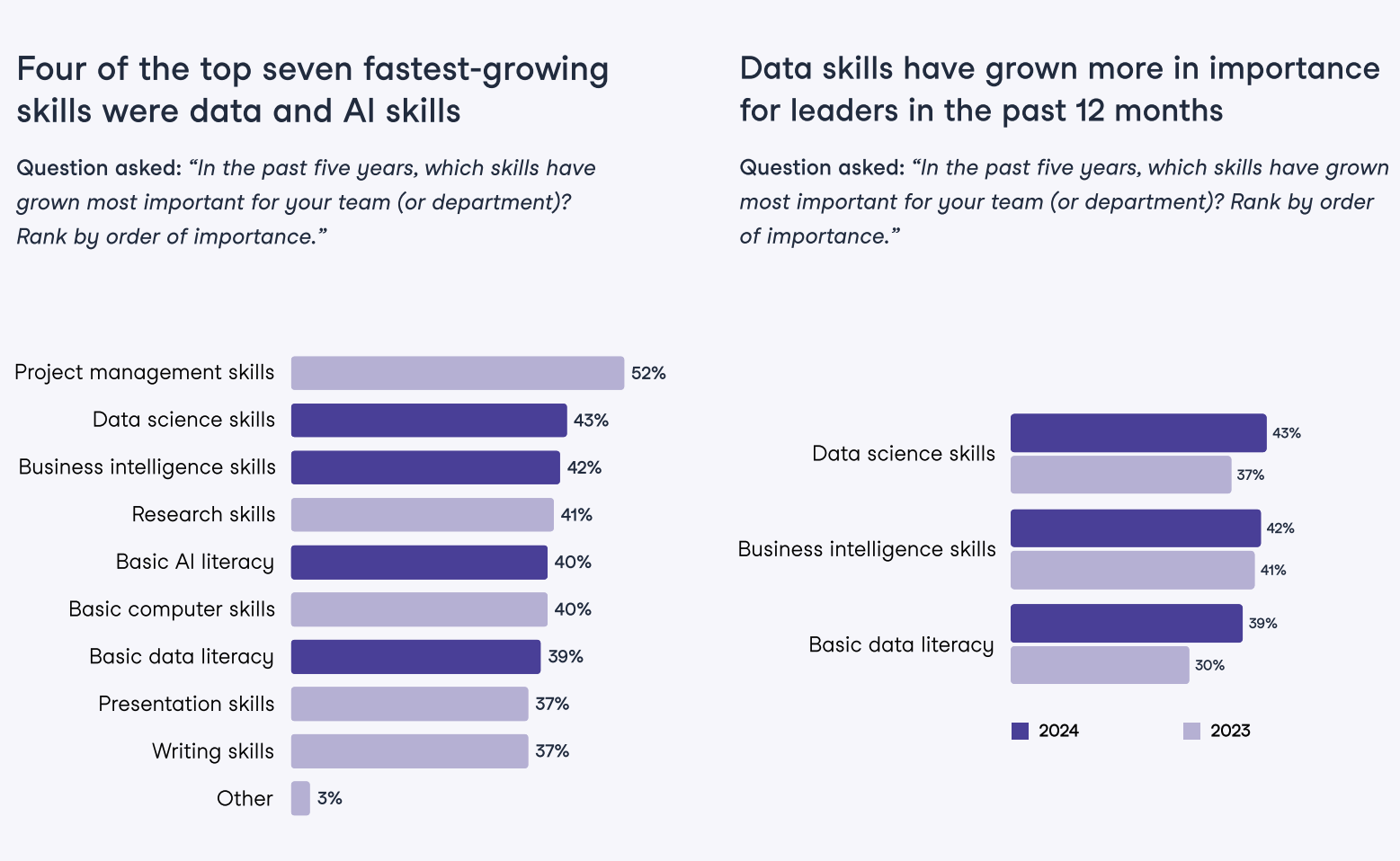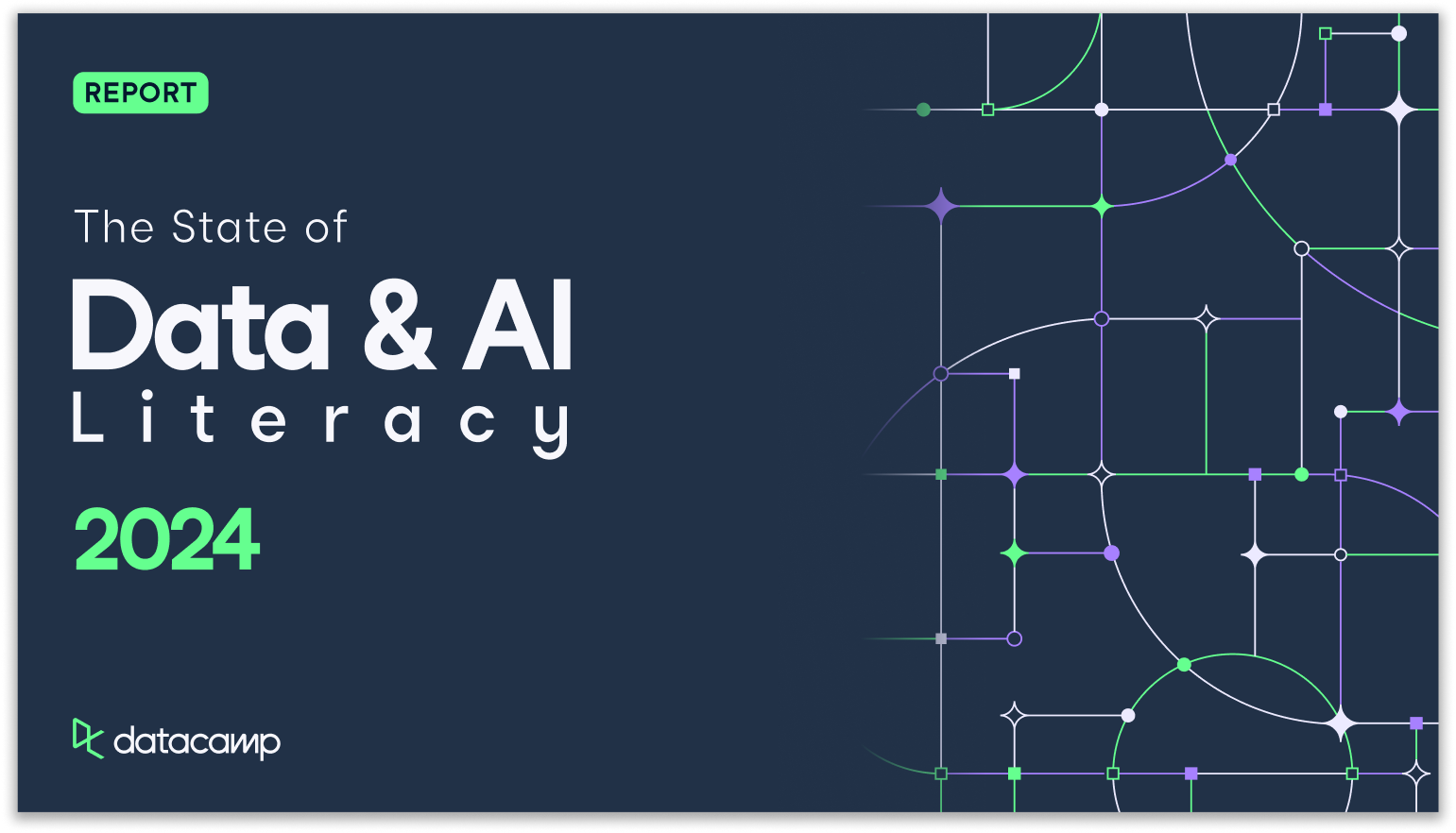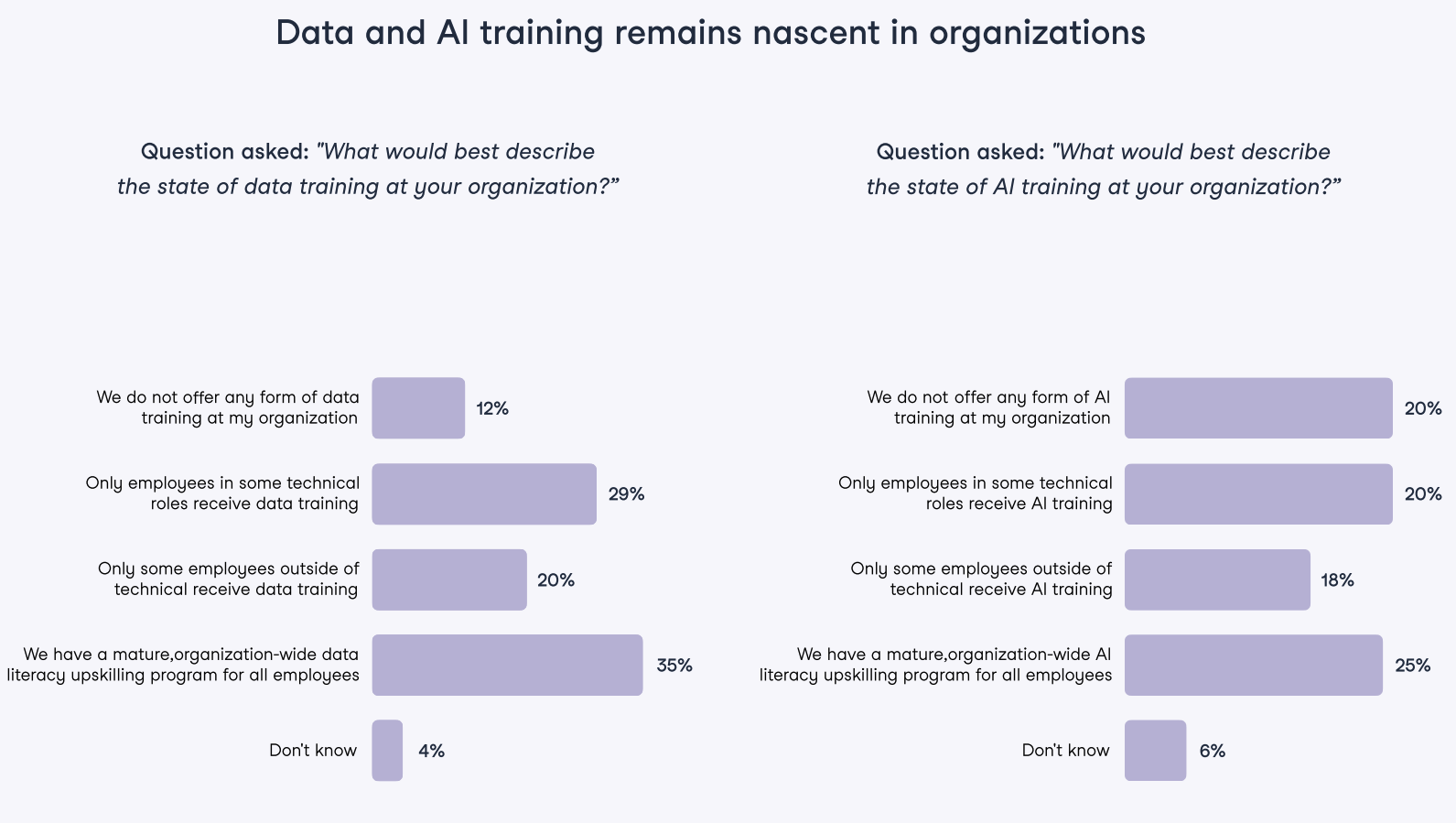Advances in artificial intelligence are swiftly changing the business environment across all kinds of industries. Tasks that may previously have taken hours can now be completed within minutes, and a swathe of new AI tools are helping professionals save time and find new efficiencies - if they have the skills to use them.
For organizations to capitalize on these powerful new tools and technologies, it’s crucial that they have a workforce that’s equipped with the necessary skills and knowledge to change with the environment. That’s where reskilling and upskilling, particularly in data and AI, become crucial facets of modern business strategies.
In this article, we explore the growing importance of reskilling and upskilling, the impact of AI on these areas, and the challenges and opportunities it presents for organizations. We also explore some upskilling strategies to help business leaders mobilize their workforce to adapt to new ways of working.
Elevate Your Organization's AI Skills
Transform your business by empowering your teams with advanced AI skills through DataCamp for Business. Achieve better insights and efficiency.

What are Reskilling and Upskilling?
Let’s start with some definitions.
Reskilling and upskilling are critical components of a comprehensive workforce development strategy, particularly in an era where AI and automation are redefining job roles and industry requirements.
Reskilling involves training employees to acquire entirely new skills that enable them to move into different roles within the organization. This approach is particularly crucial when certain jobs become obsolete due to technological advancements.
For instance, as AI systems take over routine tasks, reskilling programs can help employees transition to roles that require more complex problem-solving and strategic thinking.
Upskilling, on the other hand, focuses on enhancing employees' existing skills to improve their performance in their current roles.
This type of training ensures that employees remain competent and efficient as their job requirements evolve. For example, as new AI tools are integrated into marketing strategies, upskilling marketing professionals to use these tools effectively becomes essential.
Importance in maintaining a competitive workforce
Both reskilling and upskilling are vital for maintaining a competitive and agile workforce. According to some estimates, AI could potentially replace around 300 million jobs worldwide by 2030.
This transition highlights the importance of strategic reskilling initiatives to prepare the workforce for new roles that leverage emerging technologies.
Moreover, upskilling ensures that employees stay updated with the latest industry trends and technological advancements. This continuous improvement not only enhances individual performance but also drives overall organizational growth and innovation.
Examples in industry
Industries across the board are witnessing the transformative impact of AI, necessitating focused reskilling and upskilling efforts:
- Manufacturing: As AI-driven robotics and automation become more prevalent, reskilling programs for assembly line workers to handle advanced manufacturing processes or to transition into maintenance and troubleshooting roles are essential.
- Healthcare: The adoption of AI in diagnostics and patient care requires healthcare professionals to upskill in areas like data analysis and AI-based diagnostic tools, ensuring they can leverage these technologies to improve patient outcomes.
- Finance: Financial institutions are increasingly using AI for risk assessment and fraud detection. Reskilling programs for traditional bank employees to become proficient in AI and cybersecurity are crucial for adapting to these changes.
By understanding and implementing effective reskilling and upskilling strategies, businesses can not only retain their valuable workforce but also drive continuous innovation and maintain their competitive edge in an AI-driven world.
The Role of AI in Driving the Need for Reskilling and Upskilling
Artificial Intelligence (AI) and automation are profoundly reshaping the workforce by altering job roles and skill requirements. According to a report by PwC, by the mid-2030s, up to 30% of jobs could be automated, with significant impacts across various sectors. These technologies are not just changing how tasks are performed but are also creating new roles that require specialized skills.
For example, in customer service, AI chatbots and virtual assistants are automating routine inquiries, which reduces the need for traditional customer service roles while increasing the demand for employees skilled in managing and improving AI systems.
Similarly, in logistics, AI-driven predictive analytics are optimizing supply chains, necessitating skills in data analysis and machine learning.
The integration of AI into business processes is shifting the skill sets required across all levels of the workforce. According to the DataCamp State of Data & AI Literacy Report 2024, 62% of leaders believe AI literacy is now important for their teams’
day-to-day tasks. Furthermore, four of the top seven fastest-growing skills were data and AI skills.

Data from the State of Data & AI Literacy Report 2024
Other organizations have highlighted different trends. The OECD and World Economic Forum have previously emphasized the need for "soft skills" like complex problem-solving, critical thinking, and emotional intelligence, which are less susceptible to automation. These skills complement technical abilities and are essential for employees to effectively collaborate with AI systems.
With these factors in mind, forward-thinking companies are taking proactive steps to address these evolving skill requirements. For instance, in 2020, Amazon committed to investing $700 million to upskill 100,000 employees by 2025, focusing on areas such as cloud computing, machine learning, and IT support.
Similarly, in 2023, IBM committed to training 2 million people in AI skills over a three-year period to help close the global AI skills gap.
Download the State of Data & AI Literacy Report 2024
Uncover what 550+ leaders in the US & UK believe about the state of their teams’ data & AI skills.

Benefits of Reskilling and Upskilling for Businesses
We’ve highlighted that there is a very clear need for reskilling and upskilling across all kinds of organizations. But what about the benefits that these practices bring, particularly in the age of AI?
Enhancing employee adaptability and productivity
Reskilling and upskilling are vital strategies for businesses looking to enhance employee adaptability and productivity. With the rapid integration of AI technologies, the demand for new skills has surged. According to the DataCamp State of Data & AI Literacy report, AI literacy is a natural extension of data literacy.
Understanding AI concepts and their application is essential for employees to effectively work with AI systems and enhance their productivity.
The rise of generative AI has only intensified this need for AI skills training. As Eric Siegel, founder of Machine Learning Week, noted,
If we can get everyone up to speed when scoping machine learning projects, then business stakeholders and data experts can speak the same language and deeply collaborate.
Eric Siegel, Founder of Machine Learning Week
This highlights the importance of upskilling employees to ensure they can effectively utilize AI tools and contribute to business goals.
Reducing the skills gap
The skills gap is a significant challenge for many organizations. By investing in reskilling and upskilling programs, businesses can bridge this gap and ensure their workforce is prepared for future demands.
According to the World Economic Forum, 85 million jobs may be displaced by 2025 due to automation, but 97 million new roles could emerge, emphasizing the need for a skilled workforce capable of adapting to new technologies.
Improving employee retention and job satisfaction
Employees are more likely to stay with a company that invests in their development. Those professionals who feel valued and see opportunities for growth are more likely to remain loyal and engaged. By providing reskilling and upskilling opportunities, businesses can enhance job satisfaction and reduce turnover rates.
Driving innovation and growth
A skilled workforce is a key driver of innovation. By continuously reskilling and upskilling employees, businesses can foster a culture of innovation and stay ahead of the competition.
Enhancing collaboration and communication
AI literacy, as an extension of data literacy, emphasizes the importance of a common data language between business and technical teams. However, as Kyle Daigle, COO of GitHub, mentioned,
You still have to start with asking the right questions. You have to find a trail of questions and go down that trail.
Kyle Daigle, COO of GitHub
By upskilling employees in AI and data literacy, businesses can enhance collaboration and communication across departments, leading to more effective and innovative solutions.
Effective Strategies for Implementing Reskilling and Upskilling Programs
So, we’ve seen the benefits of upskilling and reskilling, particularly in the context of AI advancement. But how can organizations and their leaders go about implementing such training agendas?
Here are some effective strategies:
1. Expand existing data upskilling programs to focus on AI literacy
Expanding existing data literacy programs to incorporate AI skills is a practical way to address the skills gap. According to the DataCamp State of Data & AI Literacy report, AI literacy should be treated as an extension of data literacy. This approach ensures that employees understand the interconnected nature of data and AI, facilitating a smoother transition and better application of these skills in their roles.
Jordan Morrow, Senior Vice President of Data and AI Transformation at AgileOne, emphasizes this integration:
AI and machine learning have always been a part of the data language. We shouldn’t be distinguishing between AI and data literacy; they are both complementary skill sets that will help us move forward in a more data-driven and analytical world.
Jordan Morrow, Senior Vice President of Data and AI Transformation at AgileOne
2. Broaden the scope of upskilling programs
To maximize the benefits of reskilling and upskilling, it's essential to extend these programs to a wider audience within the organization. As noted in the DataCamp report, organizations with mature, organization-wide data and AI literacy programs report significantly higher benefits, such as faster decision-making (90%), improved innovation (87%), and better employee retention (81%).
A prime example is Colgate-Palmolive, which upskilled over 14,860 employees on data literacy and expanded the program to include AI skills, benefiting 18,000 learners with access to AI content.
This broad approach ensures that all employees, regardless of their department, are equipped with the skills necessary to leverage AI effectively in their roles.
3. Center interactivity and personalization in learning programs
Personalization and interactivity are crucial for effective learning, especially for technical skills like programming and AI. Rolls Royce's partnership with DataCamp is a testament to this approach. By using tailored learning tracks and interactive Python courses, Rolls Royce enabled its engineers to swiftly integrate new knowledge, significantly accelerating the design process.
4. Treat AI literacy as a force multiplier
AI literacy should be viewed as a force multiplier for existing data literacy programs. Tools like ChatGPT and other generative AI technologies have made data tasks more accessible, reducing the barrier to entry for meaningful data work. According to Nick Magnuson, Head of AI at Qlik,
Generative AI can efficiently summarize text, create content, and generate or interpret code, highlighting its transformative potential in data-related tasks.
Nick Magnuson, Head of AI at Qlik
By equipping employees with AI skills, organizations can accelerate the adoption and effective use of newly acquired data skills, driving greater innovation and efficiency across all business functions.
5. Be proactive about change management and positive reinforcement
Introducing AI and data technologies into the workplace can cause anxiety and resistance among employees. Effective change management strategies are essential to address these concerns. Leaders should clarify the benefits of AI and data upskilling, proactively address fears related to automation, and celebrate early adopters who champion these initiatives.
Andrew McAfee from the MIT Sloan School of Management emphasizes the importance of changing toward a data culture, stating,
The way you make an organization better is not by sending people off to cutting-edge training on data science or AI ethics or whatever else. It's by getting the right norms in place.
Andrew McAfee, MIT Sloan School of Management
Creating a supportive environment that celebrates learning and adaptation helps mitigate resistance and fosters a culture of continuous improvement.
Challenges in Reskilling and Upskilling in the AI Era
Of course, such upskilling and reskilling programs come with their own challenges. As we saw in the State of Data & AI Literacy Report, data and AI training remains nascent in many organizations.

Data from The State of Data & AI Literacy Report
Overcoming resistance to change
One of the primary challenges in implementing reskilling and upskilling programs is overcoming resistance to change among employees and management. The introduction of AI and data technologies often leads to concerns about job security and the relevance of existing skills.
Effective change management strategies are crucial to address these concerns. Leaders should focus on clear communication about the benefits of AI and data upskilling, addressing fears related to automation, and celebrating early adopters who embrace these new technologies.
Ensuring access to resources and training
Despite progress, data and AI training remains in its infancy. That being said, only 12% of leaders report offering no data training, down from 18% last year. Furthermore, more organizations are expanding data training to non-technical roles, increasing from 14% to 20% over the past year. However, the expansion of these programs hasn't kept pace with the increasing demand for data skills.
When it comes to AI training, in particular, the situation is more concerning. A significant 26% of leaders report that they do not offer any form of AI training, and another 26% reserve AI training for technical roles only. Only 18% extend such training to non-technical staff, and 25% have established comprehensive, organization-wide AI literacy programs.
Organizations should promote continuous learning and ensure that both data and AI training programs are available to all employees, not just technical staff.
Balancing work responsibilities with training commitments
Employees often struggle to balance ongoing work responsibilities with the time required for training. This challenge is particularly pronounced for non-technical roles that may not traditionally prioritize continuous learning.
Creating flexible training schedules and integrating learning into daily workflows can help alleviate this burden. For example, learning platforms and training modules can provide self-paced learning opportunities that fit into busy schedules.
Addressing the skills gap
The skills gap remains a significant hurdle. The State of Data & AI Literacy report shows that, while there has been a 4% increase in organizations with mature data literacy programs available to everyone, from 31% in 2023 to 35%, there is still much room for growth.
The urgency to address the AI skills gap is even more critical, as current AI training efforts lag behind those for data skills. Leaders need to prioritize AI literacy and ensure that both technical and non-technical staff are equipped with the necessary skills to navigate an AI-driven future.
Implementing personalized and interactive learning programs
Personalized and interactive learning experiences are crucial for effective reskilling and upskilling. Traditional, one-size-fits-all training programs often fail to engage employees or address their specific needs.
Organizations should focus on creating tailored learning paths and incorporating interactive elements such as hands-on projects and real-world applications. Rolls Royce's success with personalized Python courses for their engineers, resulting in significantly accelerated design processes, highlights the effectiveness of this approach.
Why Choose DataCamp for Business for Upskilling and Reskilling Programs?
Comprehensive learning solutions
DataCamp for Business offers an extensive library of over 350 courses in data science, AI, and analytics, catering to various proficiency levels. Their tailored learning paths ensure that training aligns with organizational goals, making it relevant and effective for employees.
Engaging and interactive platform
The platform emphasizes hands-on learning with interactive exercises and real-world projects, enhancing understanding and retention. Gamification elements and regular assessments keep learners motivated and track progress.
Proven success and recognition
Companies like Rolls Royce and Colgate-Palmolive have successfully upskilled thousands of employees with DataCamp, demonstrating the platform's flexibility and effectiveness. DataCamp's programs are endorsed by industry leaders and experts, ensuring high-quality training.
Integration of AI and data literacy
DataCamp treats AI literacy as an extension of data literacy, offering courses that help employees understand AI's role in data analysis and decision-making. This holistic approach ensures comprehensive skill development.
Scalable and supportive
DataCamp's platform can scale to support organizations of all sizes, from small teams to large enterprises. They provide dedicated support for implementing and managing training programs, ensuring success and continuous improvement.
Choosing DataCamp for Business ensures your organization is equipped to navigate the complexities of an AI-driven landscape, building a future-ready workforce through comprehensive, interactive, and scalable solutions.
Training 2 or more people? Check out our Business solutions
Get your team access to the full DataCamp library, with centralized reporting, assignments, projects and more

Final Thoughts
AI is fundamentally changing the way we work, and there is a strong sense that we’re still only at the beginning of this journey. For modern organizations of all sizes, the imperative to upskill and reskill employees will only become greater.
For leaders responsible for such a task, applying a through framework and introducing a data culture is essential. By working with DataCamp for business, you can tailor your upskilling and reskilling efforts to the needs of your organization, showing results that can help deliver a healthy ROI and future-proof your workforce. Speak with a member of the team today to learn more and request a demo.

A senior editor in the AI and edtech space. Committed to exploring data and AI trends.

